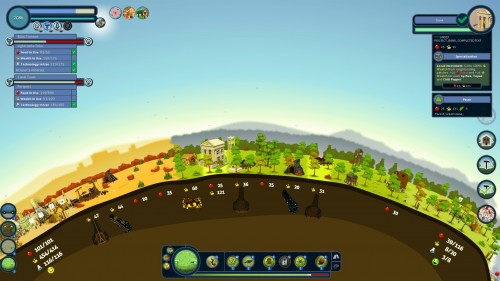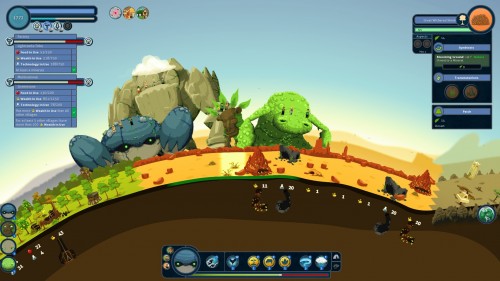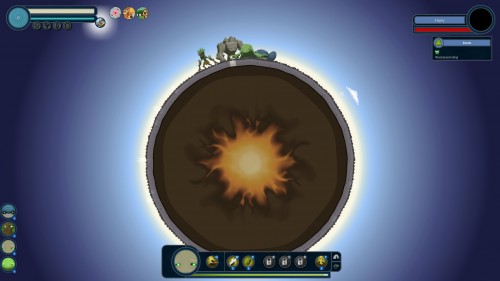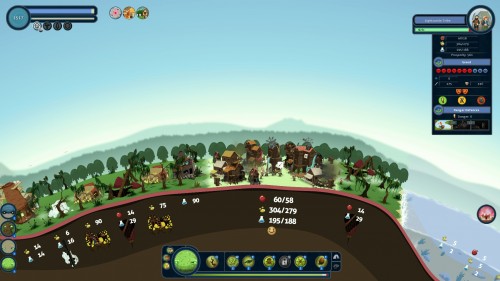What is Reus? I have no idea, and I’ve played it for about 3 to 4 hours now. As the title says, it’s weird. In a good way, but still weird. In any case, I feel I’ve played it enough to say something about it, so here goes. I wonder how this new posting format will work.
What is Reus about?
Back when Reus was still getting announced and hyped up by various bloggers and YouTubers, I thought it was a sort of 2-D Populous or Black and White. Basically, I expected a strategy/god-sim. It is those things, but for the most part, it’s something else.
The basic plot is simple. You are some sort of deity and you act through four elemental giants – a forest giant, an ocean giant, a mountain giant and a swamp giant. They have abilities which they use to seed a barren world with resources – food, technology and wealth. Soon after you start doing this, the first village is settled, which then has demands and needs. They start projects, which are, simply put, slightly bigger demands. If you help them complete these projects, they give you an ambassador of whichever region the village is located in. This ambassador can then climb one of your giants and give him a new ability or improve an existing one.
The thing that complicates things (slightly intentional), is that giving a village too much causes them to get greedy. Make them too greedy and they could go to war with another village, or even attack your giants. Even war can sometimes be a welcome thing, though, as some of the projects can have requirements such as x battles won, etc. I’m probably paraphrasing here, but you get the point.
There is no real campaign in Reus. By that, I mean there are no levels with clear goals you need to get through. Instead, you get to play through an era, which initially lasts 30 minutes. During that era, your goals are achievements the game is packed with. Each single achievement unlocks a new resource, which improves your ability to grow your villages and finish projects.
Completing enough projects grows your player level, which enables you to play an era for longer. According to the official game wiki (which you can get to from a link within the game), there are three levels and I’ve gotten all three of them, meaning I can now pick between an era lasting 30, 60 or 120 minutes.
I’m also at 38 out of 123 total achievements, meaning I’m about 31% done with the game. However, I get the sense that it’s a bit like the Binding of Isaac here – some achievements are easier and some are harder to get.
What is Reus like?
It’s good. I couldn’t honestly claim anything else. Reus is a good, fun and interesting game, giving you plenty of toys to play with.
It’s not the best game ever, and it’s not extremely deep, but it’s deep enough to make you interested and fun enough to make you each for that one more era feeling. The thing about that – I’m not sure how these new 120 minute eras I just unlocked will fit into it all. 30 minutes was short, 60 felt just right, but 120 means I probably won’t be able to play through them in one sitting, which may end up sucking. I’ll let you know in my next posting.
It’s not an extremely easy game either, which is good. I haven’t lost a giant yet, but the wiki says that if this happens, the current era and all obtained achievements while playing it are simply lost. Considering I’m still only starting to play, that I nearly lost should probably say something.
There are probably two things that keep me interested at the moment. The first one is the sheer amount of things you can build, collect, gather and unlock. You just want to see what else you can get. I know I said the game isn’t very deep, and I’m sticking to that claim, but it definitely is very wide. It’s kind of like that foot-deep ocean metaphor many people use to describe Skyrim, except I feel it works better with a game like Reus.
The second thing is the fact that, no matter how badly I played up to this point, I unlocked something after each playthrough. I’m sure this won’t be the case as less and less achievements remain, but by then, I’m hoping the focus will shift on making it my goal to attain an individual achievement.
So, one more time, Reus?
- I like it.
- It’s fun.
- It’s not very deep.
- It has a lot of content.
- I’ll keep playing.
- Giants!
Also, did you know why it’s called Reus?
Because in Dutch, Reus means Giant, not the adjective, the pronoun.
Addendum: Two Days Later
I am now at 53 out of 123 achievements and 43% completion. I managed to play through a single 120 minute era and realized I’m only scratching the surface of difficulty.
By the end of the era, the biggest villages were killing each other off with me stuck in the middle, trying to keep things afloat. They were literally eradicating each other.
At one point, my ocean giant got to close to the conflict and got assaulted by one of the armies. Before I had a chance to react, It was dead and it the era was lost. Then I realized something – I’ve been playing too many perma-death games.

Pictured: A transition between a forest and desert. Transitions aren’t subtle, but they look good anyway.
This isn’t the end. There’s an autosave function, so if you lose a giant, you can always reload to a point in time a few minutes prior to the fatal event. Playing iron man as some would call a mode where you never reload and only ever save to take a break is possible and even exist as an option in the advanced era settings at the start of the game, but it certainly isn’t imagined as the default mode of play. How would it – it takes two hours to play through a bigger era.
The setting
Also, consider the implications of Reus. At one point, four giants wake up on a barren rock of a world. They make it a living place again, where humans can settle and thrive. Soon enough, the giants are forced to actively fight these humans and their tendencies in order to keep them alive and thriving. Once they long sleep cycle has them go back to sleep, the planet is left to fend for itself and by the time they wake up, it’s a barren rock all over again.

Pictured: The giants are ready to go to sleep. They are huddled together for safety – the humans are out for blood.
These humans are completely useless and that’s putting it mildly. A more appropriate wording would be to say that they are actually bad for the planet or life in general. As soon as they get to a good spot in their development – an abundance of knowledge, food or wealth, they decide it’s a good idea to eradicate their neighbors, or maybe even bite the hand that feeds them – the giants.
I mean, it makes for a fun game, but it’s horrifying to imagine what kind of creatures these nomads are.
But, one more time:
- It’s fun.
- I like it.
- It’s maybe a bit deeper than I thought.
- It’s still not very deep.
- I’ll keep playing.
I can actually honestly say that playing through an era of Reus in the evening is now something I’m looking forward to during a work day. It’s been a while since I felt like that about a newer game.










